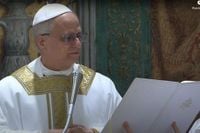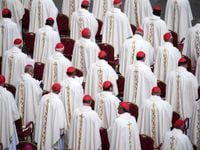In a significant moment for the Catholic Church, Cardinal Robert Francis Prevost has been elected as Pope Leo XIV, marking him as the first American pontiff in history. The announcement came after a papal conclave held on May 8, 2025, where more than two-thirds of the cardinals voted in favor of Prevost, a 69-year-old cleric known for his reformist ideals and extensive missionary work in Peru.
Prevost, who was born in Chicago, has spent decades serving marginalized communities in Latin America, and his election is seen as a bridge between the church's rich traditions and the contemporary issues facing its global congregation of 1.4 billion members. In his first address to the public, he emphasized the importance of faith and community, stating, "You have called me to carry the cross and to be blessed with that mission," during a Mass held in the Sistine Chapel.
The Vatican's financial state has been a pressing concern for the church, with reports indicating an operating deficit of 83 million euros ($94 million) for 2023, a stark increase from the previous year's shortfall of 33 million euros ($38 million). The church's financial woes stem from rising operational costs, including salaries and building maintenance, alongside a significant pension fund deficit estimated at 631 million euros ($717 million) by the Vatican’s Secretariat for the Economy in 2022.
Prevost's election comes at a time when the Catholic Church is grappling with the fallout from various scandals, including financial mismanagement and the ongoing crisis of clergy sexual abuse. His predecessor, Pope Francis, made strides in addressing corruption within the Vatican, yet many challenges remain. The new pope's background in mathematics, coupled with his experience in church administration, makes him a fitting candidate to tackle these financial issues head-on.
In his first homily, Pope Leo XIV painted a vision of the church as a beacon of hope and compassion, stating, "The Church is not great because of the magnificence of her structures or the grandeur of her buildings, but rather through the holiness of her members." This reflects a continuity with Pope Francis' focus on humility and service to the poor.
The name Leo has historical significance within the papacy, having been chosen by several influential popes throughout history. The last pope to bear the name, Leo XIII, was known for his advocacy of social justice and workers' rights, notably through the encyclical "Rerum Novarum" in 1891. This choice of name may indicate that Pope Leo XIV intends to continue addressing social issues, particularly in the context of a changing global landscape.
As the first American pope, Prevost’s election is being celebrated not just in the United States but also in Peru, where he served as a bishop. His dual nationality reflects the diverse tapestry of the Catholic Church today, which is increasingly global in its outlook and responsibilities. The reaction from various corners has been mixed; while many celebrate his election as a historic occasion, some right-wing media figures have expressed concern over his previous criticisms of political figures and his stance on immigration.
During the Mass, Pope Leo XIV addressed the challenges facing the church, acknowledging the need for "missionary outreach" to rebuild faith and counteract the decline in religious adherence, which he linked to widespread violations of human dignity. He emphasized that the church must remain relevant and engaged with contemporary issues, calling for a renewed commitment to serving the marginalized and those in need.
The new pope's approach appears to be one of continuity with Francis' reformist agenda, which sought to make the church more accessible and accountable to its followers. Prevost's experience with diverse communities in Peru may enhance his ability to connect with Catholics around the world, especially as the church navigates complex social and political landscapes.
In a broader context, the election of Pope Leo XIV signals a potential shift within the church towards a more inclusive and socially conscious stance. His background and prior work suggest that he may prioritize issues such as poverty alleviation, social justice, and environmental stewardship, aligning with the growing calls for the church to address global challenges.
As Pope Leo XIV embarks on his papacy, he will face the daunting task of restoring faith in the institution, tackling financial instability, and responding to the ongoing crises that have plagued the church in recent years. The eyes of the world will be on him as he seeks to lead the Catholic Church into a new era, one that balances tradition with the pressing needs of a modern society.
In the coming weeks, Pope Leo XIV is expected to outline his vision for the church and address the cardinals who elected him. His leadership style, shaped by his experiences both in the United States and Peru, will likely play a crucial role in determining the direction of the Catholic Church during his tenure.





